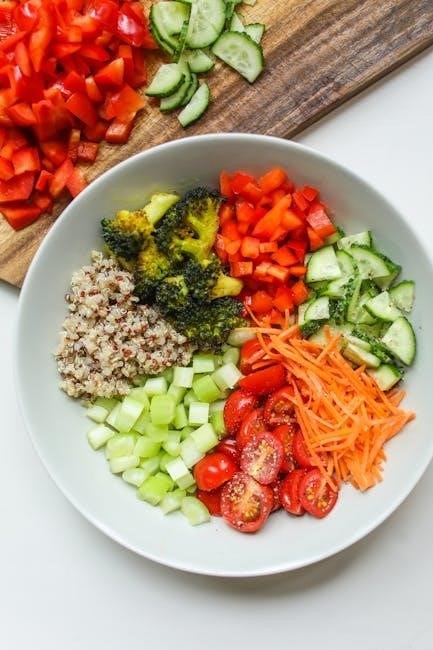lupus diet meal plan pdf

Lupus is a chronic autoimmune disease causing inflammation in various body parts. While there’s no cure, a balanced diet plays a crucial role in managing symptoms and improving quality of life. This section explores how nutrition impacts lupus management and sets the foundation for creating a personalized meal plan.
1.1 Understanding Lupus and Its Impact on Nutrition
Lupus is a chronic autoimmune disease causing widespread inflammation. It disrupts digestion and nutrient absorption, leading to deficiencies. A tailored diet helps manage symptoms like inflammation and fatigue, promoting overall well-being. Understanding how lupus affects nutrition is key to creating a diet that supports health and reduces disease activity, empowering patients to take control of their condition.
1.2 The Role of Diet in Managing Lupus Symptoms
Diet plays a vital role in managing lupus symptoms by reducing inflammation and boosting immunity. Anti-inflammatory foods, fresh produce, and whole grains help alleviate discomfort. A well-structured meal plan can minimize flares, improve energy levels, and support overall health, making it a cornerstone of lupus management alongside medical treatments.

Key Foods to Include in a Lupus Diet
Focus on anti-inflammatory foods, fresh fruits, vegetables, whole grains, and lean proteins. Omega-3 rich foods like fatty fish and nuts also help reduce inflammation and support overall health.
2.1 Anti-Inflammatory Foods
Fatty fish, flaxseeds, and walnuts are rich in omega-3s, reducing inflammation. Turmeric, ginger, and green tea also have potent anti-inflammatory properties. Incorporating these foods into your diet can help alleviate lupus symptoms and improve overall well-being. Regularly including anti-inflammatory foods in meals supports long-term health management and reduces flare-ups, making them a cornerstone of a lupus-friendly diet plan.
2.2 Fresh Fruits and Vegetables
Fresh fruits and vegetables are essential for their high antioxidant and fiber content, which helps reduce inflammation and support immune function. Berries, leafy greens, and citrus fruits are particularly beneficial. Aim for a variety of colors to maximize nutrient intake. Incorporating these foods regularly can help manage lupus symptoms and promote overall health effectively.
2.3 Whole Grains and Lean Proteins
Whole grains like brown rice, quinoa, and oats provide sustained energy and fiber, while lean proteins such as fish, poultry, and legumes support muscle health and reduce inflammation. These foods are rich in essential nutrients, making them a cornerstone of a balanced lupus diet. Incorporating them helps maintain energy levels and overall well-being.

Foods to Avoid for Lupus Management
Processed foods, refined carbohydrates, and high-sugar items can trigger inflammation. Avoid common allergens like gluten and dairy if sensitive, as they may worsen symptoms.
3.1 Processed and Refined Carbohydrates
Processed and refined carbohydrates, such as white bread, pasta, and sugary snacks, can trigger inflammation and worsen lupus symptoms. These foods lack essential nutrients and can cause energy fluctuations. Opting for whole, unprocessed alternatives like brown rice, quinoa, and whole-grain bread helps maintain balanced nutrition and reduces inflammation.
3.2 Common Food Sensitivities and Triggers
Identifying and avoiding food sensitivities is crucial for managing lupus symptoms. Common triggers include gluten, dairy, and nightshades, which can provoke inflammation. Keeping a food diary helps track reactions and pinpoint problematic foods. Eliminating these triggers can reduce flares and improve overall well-being. Consulting a healthcare provider or dietitian is recommended to tailor a personalized plan.

Sample Lupus Diet Meal Plan (7-Day Plan)
This 7-day meal plan provides balanced, anti-inflammatory options tailored for lupus management. It includes breakfast, lunch, dinner, and snack ideas, ensuring variety and nutritional benefits while minimizing triggers.
4.1 Breakfast Options
Start your day with anti-inflammatory breakfast choices like oatmeal with berries, avocado toast on whole-grain bread, or a smoothie with spinach, banana, and almond milk. Include lean proteins such as eggs or Greek yogurt to maintain energy levels. Opt for fresh, whole foods to avoid triggers and ensure a balanced, nutrient-rich start to your day.
4.2 Lunch and Dinner Ideas
Focus on balanced meals rich in whole grains, lean proteins, and vegetables. Grilled chicken with quinoa and steamed vegetables, or baked salmon with brown rice and asparagus, are excellent options. Incorporate anti-inflammatory herbs like turmeric or ginger. Avoid processed meats and opt for fresh, seasonal ingredients to ensure nutrient-dense, trigger-free meals that support overall health and reduce inflammation.
4.3 Healthy Snacks and Beverages
Opt for nutrient-dense snacks like fresh fruits, nuts, or veggie sticks with hummus. Herbal teas, green tea, and water are excellent beverage choices. Avoid sugary drinks and opt for low-sodium options. Incorporate anti-inflammatory ingredients like berries or ginger for added benefits. Keep snacks portion-controlled to maintain balanced energy levels and support overall health without triggering inflammation.

The DASH Eating Plan for Lupus
The DASH diet, high in vegetables, fruits, whole grains, and lean proteins, supports inflammation reduction and overall health, making it ideal for lupus management and symptom relief.
5.1 Overview of the DASH Diet
The DASH (Dietary Approaches to Stop Hypertension) diet emphasizes whole, nutrient-rich foods like fruits, vegetables, whole grains, lean proteins, and low-fat dairy. It limits sugary treats, refined carbs, and saturated fats. Originally designed to lower blood pressure, its anti-inflammatory properties make it a strong choice for managing lupus symptoms and improving overall health naturally.
5.2 Incorporating DASH Principles into Lupus Diet
Adapting the DASH diet for lupus involves focusing on whole, anti-inflammatory foods like fruits, vegetables, and whole grains. Emphasize lean proteins, low-fat dairy, and healthy fats while minimizing processed sugars and refined carbs. This approach helps reduce inflammation, manage symptoms, and promote overall well-being. Consulting a healthcare provider ensures a personalized plan tailored to individual needs and preferences.

Avoiding Inflammatory Triggers
Identifying and eliminating inflammatory triggers in your diet is crucial for managing lupus. Common culprits include processed foods, refined sugars, and alcohol, which can worsen symptoms and flare-ups.
6.1 Identifying Personal Food Triggers
Identifying personal food triggers is essential for managing lupus. Common triggers include gluten, dairy, and processed foods. Tracking symptoms after eating can help pinpoint sensitivities. Keeping a food diary is a useful tool to monitor reactions and tailor a personalized diet plan to reduce inflammation and prevent flares effectively.
6.2 Strategies to Minimize Inflammation
Minimizing inflammation is key to managing lupus. Focus on consuming anti-inflammatory foods like omega-3 rich fish, antioxidants, and whole grains. Avoid processed foods, sugary snacks, and excessive red meat. Staying hydrated and incorporating herbs like turmeric can also reduce inflammation. A structured meal plan helps maintain consistency and control over dietary choices, promoting overall well-being and symptom relief.
Meal Frequency and Portion Control
Eating smaller, balanced meals 4-6 times daily helps manage symptoms. Portion control ensures proper nutrition without overeating, supporting weight management and energy levels effectively.
7.1 Eating Smaller, Balanced Meals
Eating smaller, balanced meals throughout the day can help manage lupus symptoms by maintaining stable energy levels. Incorporate anti-inflammatory foods, whole grains, and lean proteins to reduce inflammation. Avoid heavy meals that may trigger discomfort. Portion control is key, as it prevents overeating and supports overall digestive health. This approach helps in maintaining a consistent nutrient intake without overwhelming the body.
7.2 Managing Portion Sizes for Optimal Health
Managing portion sizes is essential for maintaining a balanced diet and preventing overeating. Use smaller plates and measure food to avoid excessive intake. Focus on nutrient-dense foods like fruits, vegetables, and whole grains. Avoid refined carbohydrates and high-fat foods. Proper portion control helps maintain energy levels and reduces inflammation, supporting overall health and lupus symptom management effectively.

Supplements and Vitamins for Lupus
Supplements and vitamins can help address nutrient deficiencies common in lupus, such as vitamin D and iron. Always consult a doctor before adding any supplements to ensure safety and effectiveness.
8.1 Essential Nutrients for Lupus Patients
Lupus patients often benefit from key nutrients like vitamin D, omega-3 fatty acids, and antioxidants. These help reduce inflammation and support immune function. Incorporating foods rich in fiber, calcium, and iron is also crucial for overall health. Consulting a healthcare provider ensures personalized recommendations tailored to individual needs and deficiencies.
8.2 Consulting a Doctor Before Adding Supplements
Before adding supplements to your lupus diet, consulting a doctor is essential. They ensure safety, avoid drug interactions, and tailor recommendations to your specific needs. Supplements like vitamin D or omega-3s can be beneficial, but personalized advice guarantees effectiveness and minimizes risks. Professional guidance helps create a balanced approach to nutrition and health management.
A balanced diet is crucial for managing lupus symptoms. Utilize resources like downloadable meal plans and consult professionals for personalized nutrition strategies and ongoing support.
9.1 Final Tips for a Lupus-Friendly Diet
Adopting a lupus-friendly diet involves avoiding triggers, eating anti-inflammatory foods, and staying hydrated. Keep track of your symptoms and adjust your diet accordingly. Regularly consult with a healthcare provider or dietitian to tailor your plan. Downloadable meal plans and resources can provide structure and inspiration for maintaining a balanced lifestyle.
9.2 Downloadable Meal Plan PDF
A downloadable meal plan PDF offers a structured guide for managing lupus through diet. It includes daily recipes, portion sizes, and nutritional advice tailored to reduce inflammation. Created by dietitians, these plans are easy to follow and customizable. The PDF format makes it accessible and convenient, providing a clear roadmap for maintaining a balanced and lupus-friendly diet.